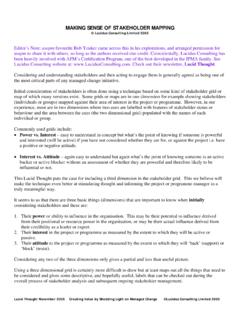Transcription of A Comparison of PMI and IPMA Approaches - PMDAN
1 PM_4-2011_1-68:Inhalt 11:25 Uhr Seite 31. A Comparison of PMI and IPMA Approaches Analysis to Support the Project Management Standard and Certification System Selection Alexander Eberle, Helga Meyer, Drew Rosen Project management continues to grow and is now applied in a wide spectrum of business sectors. There are two main professional organizations that operate at the international level fostering the discipline: the Project Management Institute (PMI) and the International Project Management Association (IPMA). The objective of this research is to help management choose between the two competing standards for implementing project management. Introduction Research Question Standardization is a process that involves many benefits.
2 Essentially, much energy and investment is wasted by In project management different standards have been individuals and organizations forced to make choices developed. These are widely used for training and devel- between competing project management standards and opment of human resources, as support for certification qualifications [2, p. 1187]. programs and as corporate project management method- By keeping in mind this quote by Lynn Crawford, one ologies. The latter use bases on the supposition that there of the most active scholars in the field of project man- is a direct relation between the application of a standard agement standards, this study addresses the selection and the performance on the workplace [2, p.]
3 87]. In par- dilemma arising when the management of an organiza- ticular, by introducing a standard, it is expected to tion has to choose between different project management improve communication, especially by harmonizing the standards and certification systems. There are many project management terminology. Another main expec- standards available on the market, however, due to their tation is to improve the quality of the project manage- global relevance, only the PMI and IPMA Approaches ment related processes [1, p. 300]. are considered in this research. Thus, the main research There are two main professional organizations that question of the thesis is: Which project management operate at international level fostering the project man- approach between those offered by PMI and IPMA is agement discipline: the Project Management Institute better for a given company?
4 , that is: Which project (PMI) and the International Project Management Asso- management standard and/or certification system should ciation (IPMA). The PMBOK Guide of PMI and the be selected (PMI/IPMA)? . IPMA Competence Baseline (ICB) are well known as This dilemma is not just a strategic question; it is a project management standards. However, the two docu- choice that if taken incorrectly may produce huge costs ments differ under many aspects. of change or business failure. The figures on the stan- A recent study [1, p. 294] has shown that in developed dards diffusion previously presented demonstrate the countries such as Germany and Switzerland, project man- topicality of the subject. Project management is spread- agement standards still have not experienced a wide dif- ing while standards are not widely diffused: in the future fusion.
5 However, the study has shown that the PMBOK . Guide and the ICB, together with its local adaptation (the NCB National Competence Baseline), are the most dif- +++ F r eilige Leser +++ F r eilige Leser +++ F r eilige Leser +++. fused project management standards in that region. In fact, among the companies that apply project manage- F r den Vergleich von IPMA und PMI wurden in der Hauptsache Sekund r- ment standards, % use at least one of the described daten benutzt. In einem zweiten Schritt wurden die Ergebnisse von halbstruk- standards (source: elaboration made from the paper's turierten Interviews mit Wissenschaftlern und Praktikern einer Inhaltsanalyse authors of the raw survey data of the study [1], courtesy unterzogen.)
6 Es zeigte sich, dass es zwei Kategorien von Kriterien gibt: solche, of Prof. Frederik Ahlemann). The IPMA and the PMI also die sich auf Aspekte innerhalb einer Organisation beziehen, und solche, die provide professional certifications that attest practition- mit Beziehungen zwischen Organisationen zu tun haben. ers' knowledge and competence in project management. Ein unerwartetes Ergebnis der Studie war, dass die Ans tze von IPMA und PMI. The previously mentioned standards are the reference kompatibel und keine Gegens tze sind, sondern dass sie vielmehr integriert documents for the certifications, which in turn, differ as werden k nnen. well, especially how the assessments are carried out. aktuell projekt MANAGEMENT 4/2011 l 31.
7 PM_4-2011_1-68:Inhalt 11:25 Uhr Seite 32. WISSEN. an increasing number of businesses will face the selec- of the 42 processes presented belongs both to a so called tion dilemma addressed by this research, in fact the knowledge area and to a process group, related to the attempts to create a common standard failed. evolution of a project (initiation, planning, execution, monitoring and controlling, closing). The ICB instead, Methodology describes 20 technical, 15 behavioral and 11 contextual competences. For each competence element there are: The research problem was addressed considering that, (1) a brief introduction of the element, (2) a list of pos- in order to take a wise decision, the management of a sible process steps to apply the competence in practice, company needs to (3) a description of the required competence grade for 1.
8 Know the two Approaches the different certification levels, (4) a list of topics for 2. understand the most important aspects that should further reading and (5) the main relations to other ele- be considered during the decision making process. ments. All competence element ranges of the ICB are dis- There is no proper analytical Comparison between the cussed in the thesis. different standards (or bodies of knowledge) available The content of the PMBOK Guide is predominantly on the market. An attempt of comparing project man- technical knowledge that should be applied to manage agement bodies of knowledge was roughly carried out projects. Similar topics are discussed in the technical in 1995 [6].
9 To the authors' knowledge in the last 15 competence elements of the ICB. However, the discus- years there has not been any trace in the international sion of PMI's standard goes more in depth proposing literature of an in depth analysis studying differences and and describing tools and methods to be applied. The ICB. commonalities, weaknesses and strengths of project remains at a higher level, the reader has to find more management standards. Thus, it was decided to realize detailed information on tools and techniques somewhere and present an up to date Comparison of the two else. Thus, the PMBOK Guide turns out to be very pre- Approaches to support the management during the deci- scriptive and normative, while the ICB provides a higher sion making process.
10 This research work was conducted degree of flexibility. A further characteristic of ICB's con- using mainly secondary data. tent is the emphasis on behavioral competence elements, Moreover, the literature review showed that apart recognized as very important for managers of projects. from common sense advises, there are no tools, frame- The PMBOK Guide does not address these topics such works or other instruments which may help the man- in depth, but just marginally, because its focus is rather agement in choosing a project management approach. on technical skills than on interpersonal ones. The Thus, to fill this knowledge gap, the aspects to be PMBOK Guide is exactly the same reference book accounted for during the selection process were investi- worldwide, also when translated in languages other than gated.







